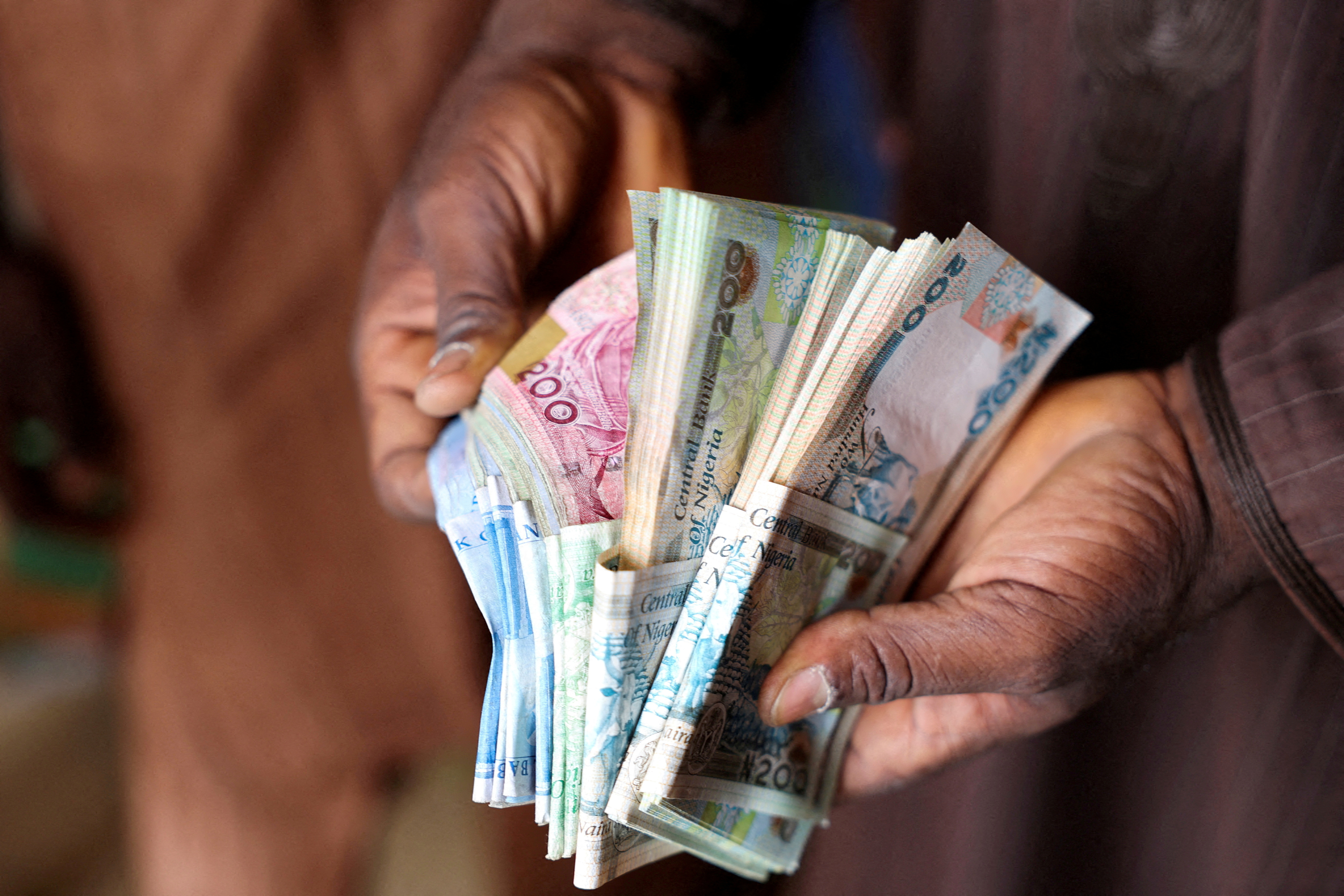A man counts Nigerian naira notes in a market place in Yola, Nigeria, February 22, 2023. REUTERS/Esa Alexander/File Photo Acquire Licensing RightsABU

A man counts Nigerian naira notes in a market place in Yola, Nigeria, February 22, 2023. REUTERS/Esa Alexander/File Photo Acquire Licensing Rights
ABUJA, Oct 27 (Reuters) – Nigeria’s naira is on the brink of breaching 1,000 per dollar after falling to an official record low of 999 last week, Refinitiv data showed, tracing its weakness on the unofficial market where it trades freely.
President Bola Tinubu removed Nigeria’s foreign currency controls in June in a bid to get transactions flowing through the official market again to help unify the naira’s exchange rates.
But that has only fuelled the currency’s weakness and added to inflationary pressures.
Here is what you need to know about the naira.
WHY IS THE NAIRA FALLING?
The central bank has a backlog of accumulated forex demand on the official market, which effectively forces individuals and businesses to head to the black market if they need dollars.
But dollar flows to Nigeria have been falling in the last few years due to declining investment and lower exports of crude oil, which account for more than 90% of the country’s export income.
Investors cheered when Tinubu lifted the currency controls, hoping a unified exchange rate would make it easier to access foreign currency, but that is yet to happen.
HOW BIG IS THE FOREIGN CURRENCY BACKLOG?
Nigeria has nearly $7 billion in forex forwards that are past due, which corporates bought from local banks. Banks then repaid foreign credit lines with their own funds when the central bank did not pay out.
That means corporates are unable to get new letters of credit, while the banks are owed dollars. New central bank governor Yemi Cardoso said clearing the backlog was a priority but he gave no timeline for how long it would take.
Some analysts say the forward agreements could be rolled over by 24 to 36 months, giving the central bank more time to find the dollars to pay off the corporates.
HOW BIG ARE NIGERIA’S FOREX RESERVES?
The country’s forex reserves fell to $33.5 billion in September from $37 billion in January, central bank data shows.
In August, the central bank published audited accounts for the first time since 2018, and revealed that its reserves included a $19 billion commitment in derivatives – slashing the liquid amount of the reserves.
JPMorgan calculated that the country’s net FX reserves stood at $3.7 billion as of the end of 2022, “significantly lower” than prior estimates.
Nigeria’s crude excess account only has $473,755, the National Economic Council said in August, down from a peak of $20 billion in 2008, after successive governments withdrew dollars to support the naira and budget spending.
WILL THE CENTRAL BANK RESTORE FOREX OPEN POSITIONS?
Nigerian banks are not allowed to have open positions on the dollar, meaning that they cannot buy forex for their own account from the market or speculate on the value of the currency.
Banks use their open net positions on foreign currency to finance short-term trade lines without resorting to the central bank for bidding. That means banks “make the market” for dollars and provide two-way quotes for buying and selling the currency, effectively creating a fully functioning forex market.
A trader said if banks were allowed to make the market on the dollar, the local currency could weaken further because they would sell to customers at rates determined by demand and supply.
Nigeria’s 2024 budget assumes a benchmark exchange rate of 700 naira to the dollar. The finance minister says the parallel market rate of 1,300 naira does not reflect the true value of the local currency.
“Given that the naira remains much weaker on the parallel market, further devaluations – and rises in inflation – are likely,” Capital Economics said in a research note.
Reporting by Chijioke Ohuocha, Editing by MacDonald Dzirutwe and Hugh Lawson
Our Standards: The Thomson Reuters Trust Principles.
www.reuters.com

COMMENTS